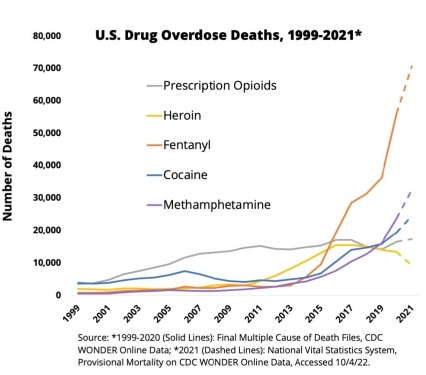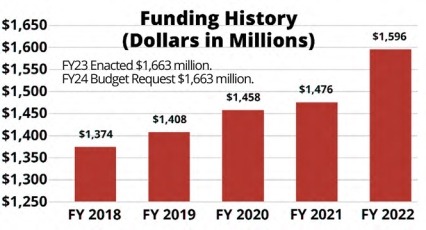The National Institute on Drugs and Addiction^ (NIDA) advances science on substance use and addiction to improve individual and public health. After decades of research, addiction is now understood to be a chronic, treatable brain disorder. NIDA-supported research has led to effective prevention and treatment for substance use disorders (SUDs), helping millions of Americans reduce their risk of overdose and recover from addiction.
The Addiction Public Health Crisis
- 40.3 million people in the United States had an SUD in 2020.*
- In 2020, only 6.5 percent of people with SUD received treatment.*
- In 2021, about 107,000 people died of drug overdoses.**
- Black and American Indian/Alaska Native people had the highest rates of fatal overdose in 2021.***
FY 2022 Research Investment
- 396 Full-time equivalents (FTEs)
- 406 New research project grants
- 554 Unique investigators
- 118 Early-stage investigators
- $706 million for opioid research
- $270 million for HIV/AIDS research
NIDA's Research Portfolio
- Basic neuroscience to understand how drugs affect brain circuits and how addiction occurs.
- Prevention research to identify and address early life risk factors for drug use and SUD. Development and testing of new therapies to treat SUD and prevent overdose.
- Supporting innovation and entrepreneurship in addiction science.
- Bringing evidence-based interventions into practice and adapting them to community needs. Addressing the impact of structural racism on addiction and in addiction research.
Recent Accomplishments and New Programs
Basic Neuroscience
- New brain imaging studies suggest that addictions to nicotine and alcohol are associated with a shared brain circuit that could be an optimal target for neuromodulation therapies. Recent evidence shows that non-neuronal cells called astrocytes influence how we respond to drugs and our vulnerability to addiction. NIDA is increasing its funding for research on mechanisms of polysubstance addiction.
Prevention
- The Adolescent Brain Cognitive Development Study (ABCD) study recently found that children exposed to cannabis prenatally were more likely to have mental health issues at ages 11-12.
- New research, including a collaboration with the ABCD study, will focus on addressing social determinants of health to prevent opioid use disorder (OUD).
Therapeutics and Medication Development and Testing
- In a recent trial, combining a medication for OUD (naltrexone) with an antidepressant (bupropion) reduced drug use and improved depression for people with meth addiction.
- New therapies under development include monoclonal antibodies and sequestrants designed to prevent meth and opioids from entering the brain.
- NIDA-funded research has led to 30 Investigational New Drug applications for OUD since 2019.
Innovation and Entrepreneurship
- NIDA provided early funding to startups tackling the overdose crisis in unique ways, such as by monitoring wastewater for patterns of drug use and providing SUD care by telehealth.
- NIDA is soliciting research from small businesses to investigate psychedelic drugs and related compounds as treatments for SUD.
Bringing Interventions into Practice
- NIDA’s Clinical Trials Network found that physician-pharmacist collaboration improves patients’access and adherence to medications for OUD.
- The Justice Community Opioid Innovation Network found that providing medications for OUD in prisons and jails reduces overdose and recidivism among incarcerated people.
- A new harm reduction research network supports research on interventions to reduce overdose and other harms from SUD, with a focus on reaching underserved populations.
References
- ^The FY24 President’s Budget proposes to rename the National Institute on Drug Abuse to the National Institute on Drugs and Addiction.
- * 2020 National Survey on Drug Use and Health
- ** 2022 CDC/National Center for Health Statistics
- *** CDC WONDER Provisional Mortality data
Download this Fact Sheet (PDF, 1.7 MB)


